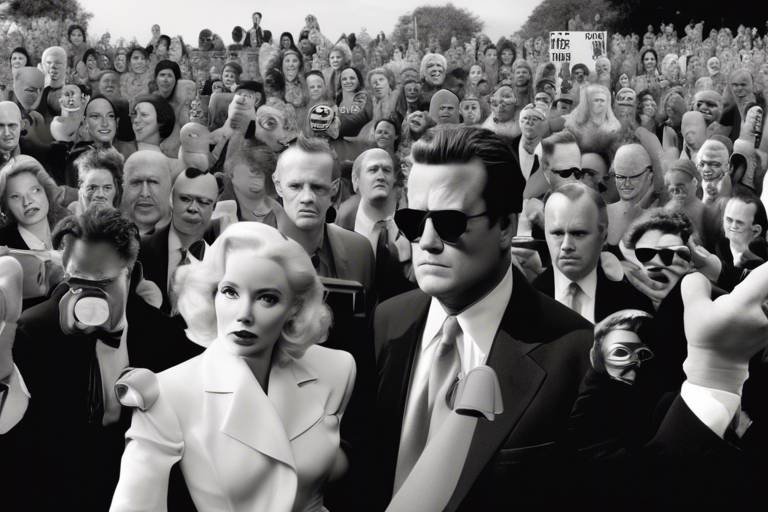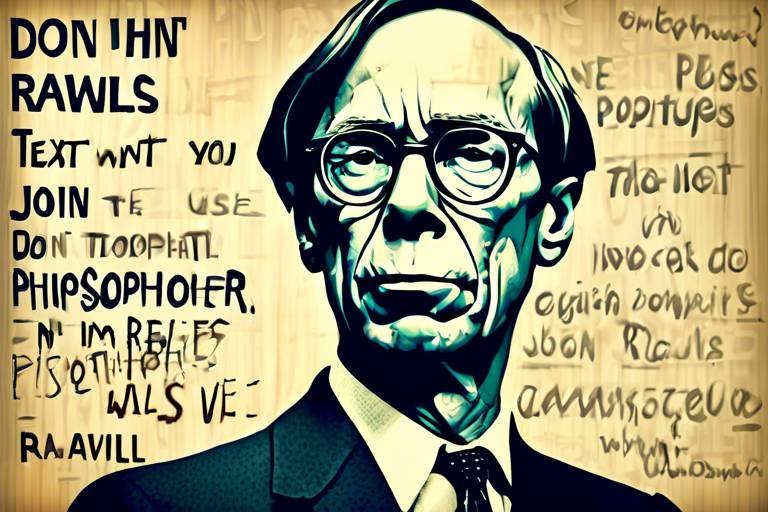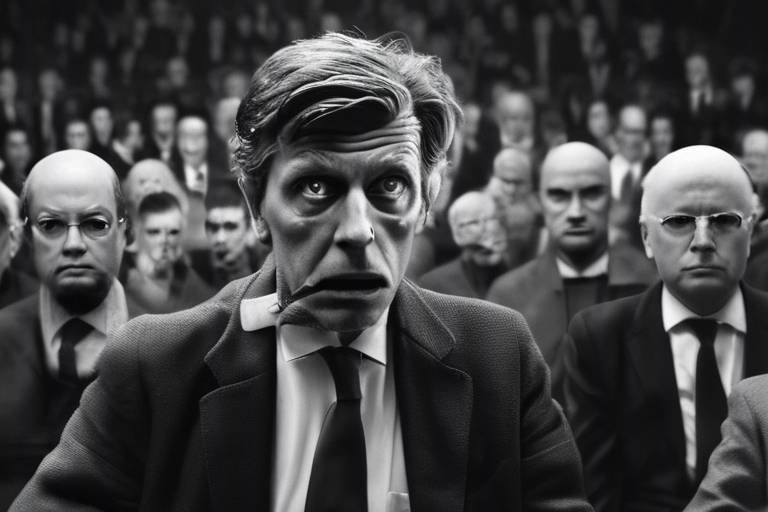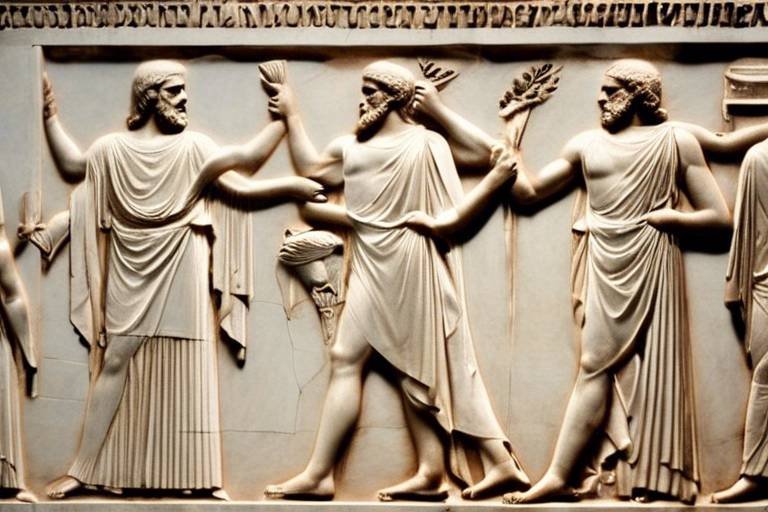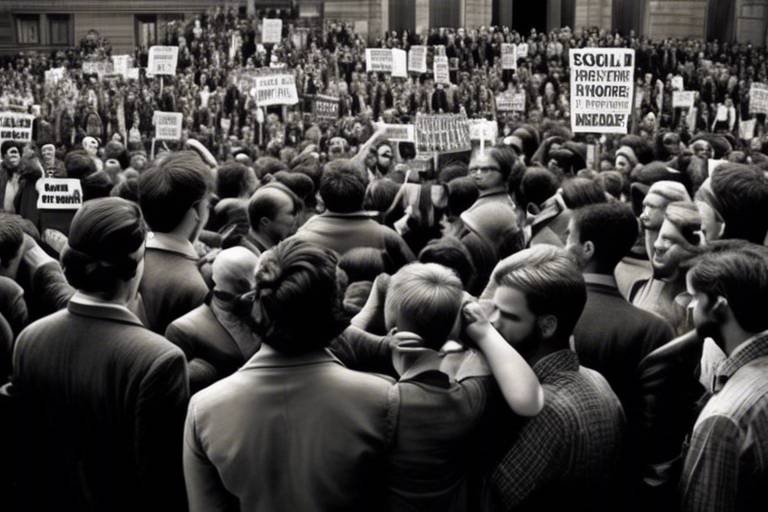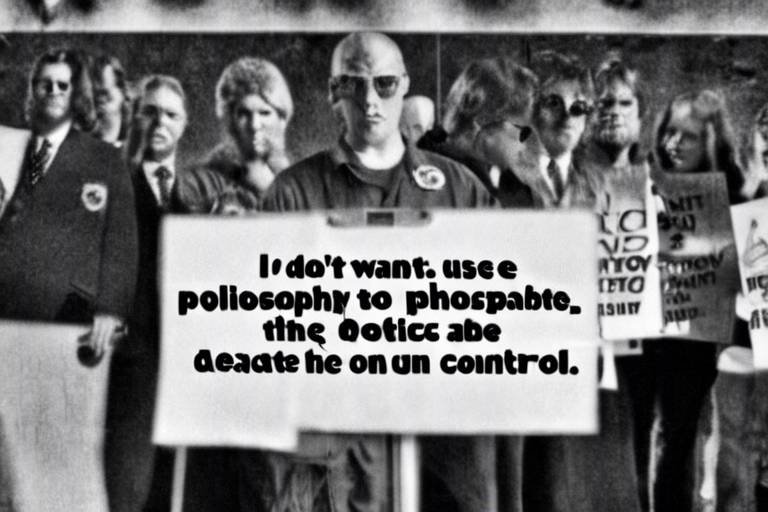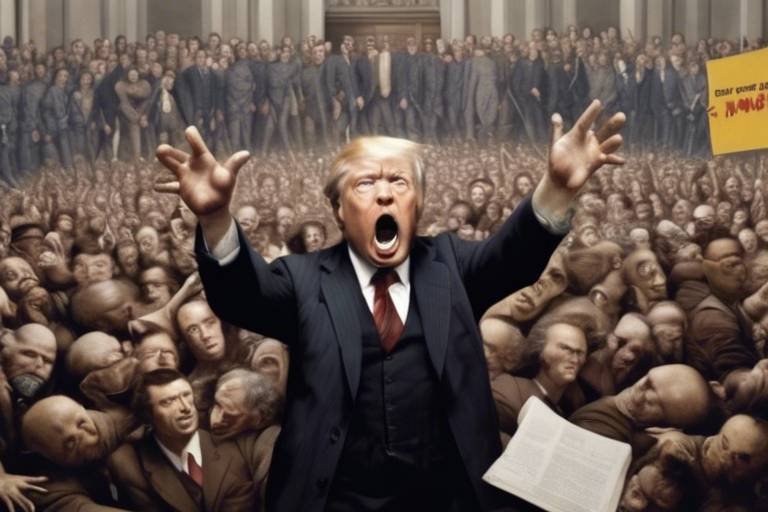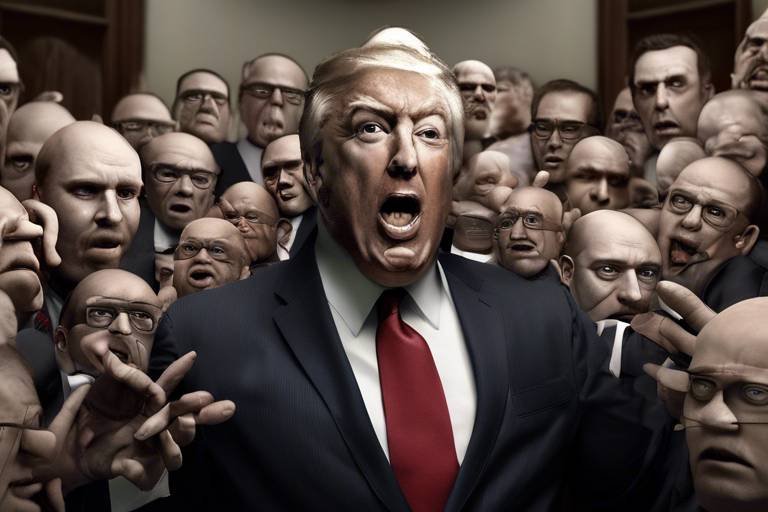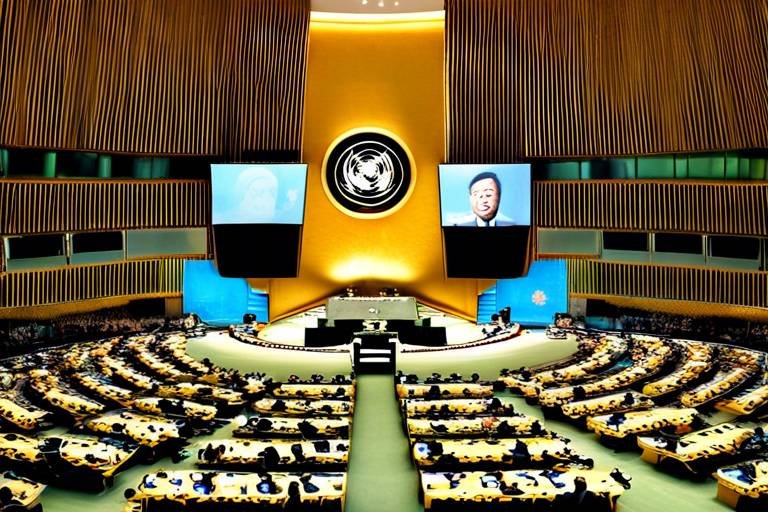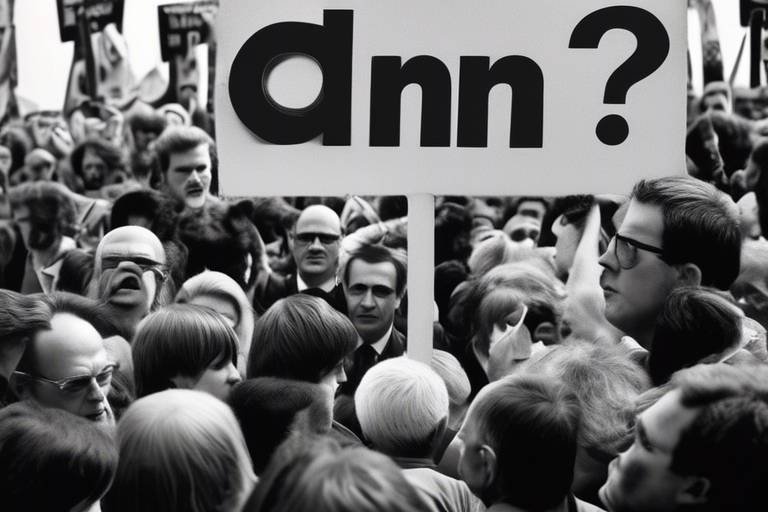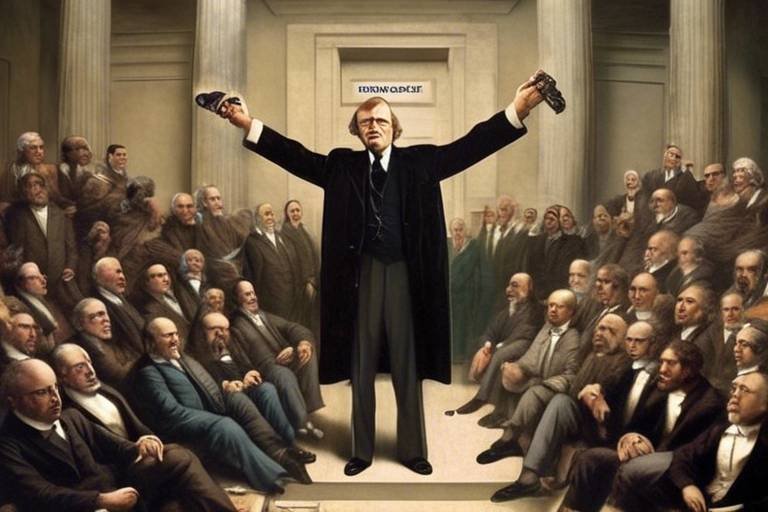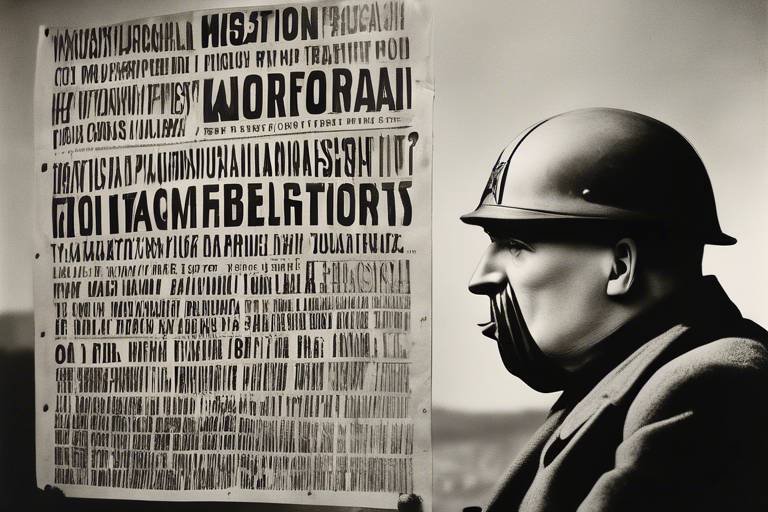The Philosophy of Pop Culture Politics
In today's fast-paced world, the intersection of pop culture and politics has become a fascinating arena that shapes our understanding of societal issues. From the catchy slogans of viral memes to the impactful speeches of celebrities at political rallies, pop culture is not just a form of entertainment; it is a powerful vehicle for political discourse. Have you ever stopped to think about how a trending song or a blockbuster movie might influence the way we think about important issues? This article dives deep into how popular media not only reflects but also shapes public opinion and societal values.
At its core, the philosophy of pop culture politics examines the intricate relationship between the media we consume and the political realities we navigate. As we explore this dynamic, we’ll uncover how pop culture serves as a mirror to our collective consciousness, illuminating the values, beliefs, and struggles of contemporary society. It’s astonishing to realize that a simple tweet or an engaging TikTok video can mobilize millions, urging them to take action on pressing issues like climate change, racial injustice, or voting rights. This phenomenon underscores the idea that pop culture is not merely a distraction but an essential component of modern political engagement.
Furthermore, the influence of pop culture extends beyond just shaping opinions; it actively participates in the political narrative, often challenging the status quo. For instance, consider how films like "Black Panther" not only entertained but also sparked conversations around representation and identity politics. These cultural artifacts question existing power dynamics and encourage audiences to envision a more equitable future. In this way, pop culture becomes a catalyst for change, urging us to reflect on our values and the society we want to build.
As we journey through this exploration of pop culture politics, we'll also consider the implications of social media, the role of pop culture icons, and the challenges posed by misinformation. By understanding these elements, we can better appreciate how deeply intertwined our cultural consumption is with political realities. So, buckle up as we navigate the vibrant landscape where entertainment meets activism, and discover the profound impact of pop culture on our political lives.
- What is the main focus of pop culture politics? Pop culture politics focuses on how popular media influences political discourse, shapes public opinion, and reflects societal values.
- How do social media platforms affect political engagement? Social media platforms facilitate rapid information dissemination, allowing for greater audience mobilization and engagement in political discussions.
- Can pop culture icons truly influence political movements? Yes, pop culture icons often serve as symbols of political movements and can significantly impact public perception and activism.
- What are the challenges of misinformation in pop culture? Misinformation can distort public understanding of political issues, undermine trust in institutions, and complicate decision-making processes.

The Role of Media in Shaping Political Narratives
Media is not just a passive observer of political events; it actively constructs the narratives that shape our understanding of the world around us. In today’s fast-paced information age, the way news is reported can significantly influence public perception and political discourse. Think of media as the lens through which we view politics. Just like a photographer can adjust focus, lighting, and angle to create a specific image, media outlets can frame political events in ways that highlight certain aspects while downplaying others. This framing can lead to a skewed understanding of the facts, which in turn impacts public opinion.
One of the most powerful tools in media's arsenal is selective coverage. By choosing which stories to highlight and which to ignore, media shapes the political landscape. For example, during election seasons, candidates may receive varying amounts of coverage based on their popularity or perceived viability. This not only affects how voters perceive each candidate but can also influence their likelihood of participating in the electoral process. When a candidate receives extensive media coverage, they often appear more legitimate in the eyes of the public, creating a self-fulfilling prophecy.
Moreover, the role of language and imagery in media cannot be overstated. The way an article is written or a news segment is produced can evoke strong emotional responses. For instance, using charged language can incite fear or hope, depending on the narrative being pushed. Consider the difference between describing a protest as a "riot" versus a "demonstration." Each term carries its own connotations and influences how the audience perceives the event. This is where media becomes a powerful player in the political arena, as it not only informs but also shapes the emotional landscape of public opinion.
In addition to traditional media, the rise of social media has introduced new dynamics in how political narratives are constructed and disseminated. With platforms like Twitter, Facebook, and Instagram, individuals can share news and opinions instantly, creating a decentralized flow of information. This shift has democratized the narrative-building process, allowing ordinary citizens to contribute to political discourse. However, it also raises questions about credibility and bias, as anyone can share information, regardless of its accuracy.
To illustrate the impact of media on political narratives, consider the following table that outlines key elements:
| Media Element | Impact on Political Narrative |
|---|---|
| Selective Coverage | Shapes public perception by emphasizing certain stories over others. |
| Language and Imagery | Evokes emotional responses that can sway public opinion. |
| Social Media | Allows for rapid information dissemination but can spread misinformation. |
Ultimately, the media's role in shaping political narratives is complex and multifaceted. It serves as both a mirror and a mold for public opinion, reflecting societal values while simultaneously influencing them. As consumers of media, it is crucial for us to remain vigilant and critical of the narratives presented to us. By understanding the mechanisms at play, we can better navigate the political landscape and make informed decisions.
- How does media influence public opinion? Media influences public opinion by framing stories in specific ways, highlighting certain events, and using charged language that evokes emotional responses.
- What is selective coverage? Selective coverage refers to the practice of media outlets choosing which stories to report on, which can create a skewed understanding of political events.
- How has social media changed political narratives? Social media has democratized the flow of information, allowing individuals to contribute to political discourse, but it also poses challenges related to misinformation.
- Why is language important in media? Language is crucial because it shapes perceptions and can influence how audiences feel about political events and figures.

Pop Culture Icons as Political Symbols
In today's world, pop culture icons are not just entertainers; they are powerful symbols of political movements and social change. When we think of figures like Rihanna, who has used her platform to advocate for various humanitarian causes, or Colin Kaepernick, whose protest against racial injustice sparked a nationwide conversation, it becomes clear that the influence of these personalities extends far beyond their respective industries. They embody the hopes, struggles, and aspirations of millions, effectively transforming their fame into a vehicle for political expression.
These icons often serve as a bridge between entertainment and activism, using their visibility to draw attention to pressing societal issues. For instance, during the Black Lives Matter movement, numerous celebrities took to social media, sharing their support and urging their followers to engage in activism. This phenomenon highlights a crucial aspect of modern political discourse: the power of celebrity influence. It raises the question, can a tweet from a pop star be as impactful as a political speech?
Moreover, the way these icons are portrayed in media can significantly shape public perception. Take the character of Katniss Everdeen from "The Hunger Games," for example. She became a symbol of rebellion and resistance, inspiring real-world movements against oppression. Her story resonates with audiences, making her an enduring symbol of courage in the face of adversity. This connection between fictional characters and real-world issues shows how narratives in popular culture can reflect and influence societal values.
Additionally, pop culture icons often participate in campaigns that align with their values, further solidifying their roles as political symbols. For example, the Ice Bucket Challenge not only raised awareness for ALS but also featured numerous celebrities who helped propel the campaign into the mainstream. The combination of entertainment and activism can lead to a powerful synergy, where the message reaches a broader audience.
However, the relationship between pop culture and politics is not without its challenges. Some critics argue that the commodification of activism, where social issues are packaged and sold as part of a celebrity's brand, can dilute the seriousness of these causes. This phenomenon raises an important question: are we truly engaging with the issues, or merely consuming them as part of our entertainment?
In conclusion, pop culture icons play a pivotal role in shaping political symbols and movements. Their influence can inspire change, mobilize audiences, and reflect societal values. As we navigate an increasingly complex political landscape, it is essential to recognize the power of these figures and the impact they can have on our understanding of social justice and political engagement.
- How do pop culture icons influence political movements?
Pop culture icons can amplify political messages, inspire activism, and mobilize large audiences through their platforms. - Can fictional characters serve as political symbols?
Yes, fictional characters often embody societal issues and can resonate with audiences, inspiring real-world movements. - What are the risks of commodifying activism?
Commodifying activism can lead to a superficial engagement with social issues, where the seriousness of the cause is overshadowed by branding and marketing.

The Impact of Social Media on Political Engagement
In today's fast-paced digital world, social media has emerged as a game changer in the realm of political engagement. Gone are the days when political discussions were limited to the dinner table or town hall meetings. Now, platforms like Twitter, Facebook, and Instagram serve as bustling arenas where ideas are exchanged, opinions are formed, and movements are ignited. But how exactly does social media influence political engagement? Let's dive deeper into this fascinating intersection.
One of the most significant impacts of social media is its ability to mobilize audiences almost instantaneously. Imagine a scenario where a viral tweet or a trending hashtag can galvanize thousands, if not millions, of people to take action. For instance, movements like #BlackLivesMatter and #MeToo have utilized social media as a powerful tool to raise awareness and drive societal change. These platforms allow individuals to share their stories, connect with like-minded people, and engage in activism, effectively breaking down barriers that once limited participation in political discourse.
Moreover, social media has democratized the flow of information. In the past, traditional media outlets often held the keys to what stories were told and how they were framed. Today, anyone with an internet connection can share their perspective, challenge dominant narratives, and contribute to the political conversation. This shift has led to a more diverse array of voices being heard, but it also raises questions about the quality of information being disseminated. With the ease of sharing comes the risk of spreading misinformation, which can skew public perception and hinder informed decision-making.
In addition to information dissemination, social media platforms have also transformed the way political campaigns are run. Candidates now use these platforms not just for advertising but for direct engagement with voters. This two-way communication fosters a sense of connection and accountability that was previously absent in traditional political campaigning. For example, during the last presidential election, candidates utilized live streams and Q&A sessions to interact with constituents, making politics feel more accessible and less intimidating.
However, the impact of social media on political engagement is not without its challenges. The echo chamber effect, where individuals are exposed primarily to information that aligns with their existing beliefs, can lead to polarization and a lack of constructive dialogue. This phenomenon creates a landscape where compromise becomes difficult, and extreme viewpoints gain traction. As a result, it's crucial for users to actively seek out diverse perspectives and engage in conversations that challenge their viewpoints.
| Positive Impacts | Negative Impacts |
|---|---|
| Mobilization of audiences for activism | Spread of misinformation |
| Diverse voices contributing to discourse | Polarization of opinions |
| Direct engagement between politicians and voters | Echo chamber effect |
In conclusion, the impact of social media on political engagement is profound and multifaceted. It has transformed the way we communicate, mobilize, and engage with political issues. As we navigate this evolving landscape, it’s essential to remain vigilant about the information we consume and share, fostering a culture of informed and respectful dialogue. After all, in the grand tapestry of democracy, every voice matters, and every click can spark a conversation that leads to change.
- How does social media mobilize political movements? Social media allows for rapid information sharing and community building, enabling individuals to organize and participate in movements more easily.
- What are the risks associated with social media in politics? Risks include the spread of misinformation, polarization of opinions, and the echo chamber effect, which can hinder constructive dialogue.
- Can social media improve political engagement among younger generations? Yes, social media platforms are particularly popular among younger demographics, providing them with a space to engage with political issues actively.

Viral Campaigns and Their Effectiveness
In today's fast-paced digital landscape, viral campaigns have emerged as a potent tool for political engagement and awareness. But what exactly makes a campaign go viral? It’s not just about catchy slogans or eye-catching visuals; it’s about tapping into the collective consciousness of the public. Think of viral campaigns as the modern-day equivalent of a grassroots movement, but with the power of the internet amplifying their reach. When a campaign resonates with people, it spreads like wildfire, reaching audiences far beyond its original intent.
One of the most fascinating aspects of viral campaigns is their ability to mobilize individuals quickly. For instance, consider the Ice Bucket Challenge that swept across social media platforms. What started as a fun challenge transformed into a powerful movement raising awareness and funds for ALS research. The effectiveness of such campaigns lies in their simplicity and relatability. They encourage participation, making individuals feel like they are part of something bigger. In this case, the act of pouring ice water over oneself became a symbol of solidarity and support for a cause.
Moreover, viral campaigns often leverage the power of influencers and celebrities, who can amplify the message to their massive followings. This is where the intersection of pop culture and politics becomes particularly interesting. When a well-known figure endorses a cause, it not only garners attention but also lends credibility. People are more likely to engage with a campaign if they see their favorite celebrity participating or advocating for it. This phenomenon can be explained through the social proof theory, where individuals look to others' behaviors to guide their own actions.
However, the effectiveness of viral campaigns is not without its challenges. While they can create a buzz and drive engagement, the fleeting nature of online attention can make it difficult to sustain momentum. Many campaigns struggle to transition from viral moments into lasting change. This is where strategic planning becomes crucial. Campaigns need to have a clear message and a follow-up strategy to maintain engagement long after the initial viral moment fades. Without this, the impact of the campaign may be temporary and fail to achieve its long-term goals.
To illustrate the effectiveness of viral campaigns, let’s take a look at some notable examples:
| Campaign Name | Year | Impact |
|---|---|---|
| Ice Bucket Challenge | 2014 | Raised over $115 million for ALS research. |
| Me Too Movement | 2017 | Created global awareness about sexual harassment and assault. |
| Black Lives Matter | 2013-present | Mobilized protests and discussions on racial injustice worldwide. |
In conclusion, while viral campaigns can be incredibly effective in raising awareness and mobilizing support, they require careful consideration and planning to ensure their messages resonate and lead to tangible change. As we continue to navigate the complexities of political engagement in the digital age, understanding the dynamics of these campaigns will be essential for activists and organizations alike.
- What is a viral campaign? A viral campaign is a marketing effort that spreads rapidly through social sharing, often leveraging social media to reach a wide audience.
- How can I create a viral campaign? Focus on creating relatable content, engage influencers, and ensure your message resonates with current societal issues.
- What are some examples of successful viral campaigns? Examples include the Ice Bucket Challenge and the Me Too Movement, both of which significantly impacted public awareness and social change.

Challenges of Misinformation on Social Media
In today's digital landscape, the have become a pressing concern for both individuals and society at large. The rapid spread of false information can create a ripple effect that distorts public perception and undermines trust in legitimate news sources. With just a few clicks, a misleading post can go viral, reaching millions before fact-checkers have a chance to intervene. This phenomenon raises an important question: How do we navigate a world where the line between truth and fiction is increasingly blurred?
One of the primary issues with misinformation is its ability to manipulate public opinion. Social media platforms are designed to prioritize engaging content, often amplifying sensationalized stories over factual reporting. This creates an environment where outrageous claims can overshadow nuanced discussions, leading to a polarized society. Moreover, the algorithms that govern these platforms often reinforce existing biases, creating echo chambers where users are only exposed to information that aligns with their beliefs. This can result in a dangerous cycle where misinformation not only spreads but becomes entrenched in public consciousness.
Another significant challenge is the impact of misinformation on political decision-making. When citizens are bombarded with false narratives, their ability to make informed choices during elections can be severely compromised. For example, misinformation about candidates' policies or personal lives can sway voters in ways that are not reflective of reality. This is particularly concerning during critical moments, such as elections or public health crises, where accurate information is crucial for the well-being of society.
To illustrate the scale of this issue, consider the following statistics:
| Statistic | Source |
|---|---|
| 70% of Americans get their news from social media | Pew Research Center |
| Over 50% of social media users have encountered misinformation | Oxford Internet Institute |
| Only 25% of users fact-check information before sharing | Stanford History Education Group |
As we grapple with these challenges, it’s essential to foster a culture of media literacy. Educating individuals on how to critically evaluate information sources can empower them to discern fact from fiction. This includes teaching people to recognize credible news outlets, understand the importance of fact-checking, and be aware of their own biases. Additionally, social media companies must take responsibility for the content shared on their platforms by implementing stricter regulations and promoting transparency regarding their algorithms.
In summary, the challenges posed by misinformation on social media are multifaceted and require a concerted effort from individuals, educators, and tech companies alike. By prioritizing media literacy and accountability, we can work towards a more informed society, where truth prevails over sensationalism and public trust is restored.
- What is misinformation? Misinformation refers to false or misleading information spread regardless of intent to deceive.
- How does misinformation spread on social media? It spreads rapidly due to algorithms that prioritize engaging content, often sensationalized, over factual accuracy.
- What can individuals do to combat misinformation? Individuals can enhance their media literacy, fact-check information before sharing, and engage with credible news sources.
- What role do social media companies play in addressing misinformation? They can implement stricter regulations, promote transparency, and enhance fact-checking measures to minimize the spread of false information.

The Influence of Film and Television on Political Ideology
Film and television are not just forms of entertainment; they are powerful mediums that shape our understanding of the world around us. Just think about it—how many times have you watched a movie or series that made you see a social issue in a new light? These visual narratives have the capacity to influence our political ideologies and beliefs in profound ways. Through storytelling, filmmakers and showrunners can craft narratives that resonate with audiences, often reflecting or challenging societal values.
One of the most significant ways film and television influence political ideology is through the portrayal of characters and scenarios that embody specific political values. For instance, consider the impact of characters like Captain America, who symbolizes patriotism and justice, versus characters like Walter White from "Breaking Bad," who represents moral ambiguity and the consequences of unchecked ambition. These characters can serve as mirrors to society, prompting viewers to question their beliefs and the political landscape. When audiences connect with these characters, they often internalize the ideologies they represent, which can lead to shifts in public opinion.
Moreover, the narratives presented in popular films and TV shows can act as catalysts for political discourse. For example, films like "Selma" and "12 Years a Slave" have reignited conversations about race relations and social justice in America. They not only entertain but also educate, providing historical context that can lead to a deeper understanding of contemporary issues. In this way, film and television can serve as a platform for activism, raising awareness and inspiring action among viewers.
Another crucial aspect is the way these mediums reflect current political climates. For example, during times of political unrest, we often see a surge in films and shows that address themes of rebellion, resistance, and social change. This not only mirrors public sentiment but can also shape it by encouraging viewers to engage with the issues being portrayed. The consumption of such media can lead to increased political engagement, as viewers are inspired to take action based on what they’ve seen. As a result, film and television become not just a reflection of society but also a driving force in shaping political ideologies.
However, it's essential to recognize the potential pitfalls of this influence. While film and television can promote understanding and empathy, they can also perpetuate stereotypes and misinformation. For example, the portrayal of certain political figures or movements can skew public perception, leading to a simplistic or biased understanding of complex issues. This highlights the responsibility that creators have in their storytelling choices. A single film or television series can have a ripple effect on public opinion, making it vital for creators to approach their narratives with a sense of social responsibility.
In conclusion, the influence of film and television on political ideology is a complex interplay of reflection and shaping. These mediums have the power to illuminate social issues, inspire change, and challenge the status quo. As audiences, we must remain critical consumers of media, recognizing the impact it can have on our beliefs and actions. By engaging with these narratives thoughtfully, we can harness their power to foster a more informed and active citizenry.
- How does film influence public opinion?
Film influences public opinion by presenting narratives that resonate emotionally with viewers, often leading them to adopt similar beliefs or perspectives. - Can television shows change political ideologies?
Yes, television shows can change political ideologies by portraying specific issues and characters that challenge viewers' preconceptions and encourage them to think critically. - What role do characters play in shaping political beliefs?
Characters serve as relatable figures through which audiences can explore complex political ideas, often leading to a deeper understanding of societal issues. - Are there risks associated with media influence on politics?
Yes, media can perpetuate stereotypes or misinformation, which can skew public perception and lead to a misunderstanding of political issues.

The Intersection of Activism and Entertainment
In the contemporary landscape, the lines between activism and entertainment are increasingly blurred. Gone are the days when social causes were only discussed in somber settings or academic circles. Today, they burst forth onto our screens, intertwining with the very fabric of popular culture. This intersection not only amplifies the voices of activists but also engages a broader audience, making social issues more accessible and relatable. Think about it: when was the last time you watched a film or a series that didn’t touch on some pressing social issue? From climate change to racial justice, the narratives we consume are often steeped in activism.
One of the most striking examples of this phenomenon is the rise of celebrity activism. Stars like Leonardo DiCaprio and Emma Watson have taken their platforms and used them to advocate for environmental and gender equality issues, respectively. Their influence is profound, as they can mobilize millions of fans to not only raise awareness but also take tangible actions. For instance, when DiCaprio speaks at the UN about climate change, he doesn't just share facts; he resonates with audiences, turning complex issues into personal calls to action.
Moreover, television shows and films often serve as a mirror reflecting societal values and challenges. Take, for example, the show "Orange is the New Black." It does not merely entertain; it opens up discussions about the prison system, LGBTQ+ rights, and systemic racism. Viewers are not just passive consumers; they become part of a larger conversation. This trend is evident across various genres, where stories are crafted to provoke thought and inspire change. The narrative arcs often echo real-world struggles, making them relatable and urgent.
Additionally, music has always been a powerful vehicle for activism. From Beyoncé's "Formation," which celebrates Black culture and addresses police brutality, to Bob Dylan's timeless anthems of protest, artists have long used their art to challenge the status quo. Music festivals, like Coachella and Glastonbury, have become platforms for activism, where artists and audiences unite for causes, creating a vibrant space for social change.
Entertainment also plays a crucial role in shaping public perception. When major film studios choose to portray certain issues, they influence how these topics are viewed in society. Documentaries, for instance, can shed light on underreported issues, as seen in films like "13th," which explores the intersection of race, justice, and mass incarceration in the U.S. Such films not only inform but also inspire viewers to engage with these topics more deeply.
As we look to the future, the relationship between activism and entertainment is likely to evolve further. With the rise of digital platforms, grassroots movements can gain visibility and traction more quickly than ever before. Social media campaigns can turn into viral sensations overnight, propelling issues into the spotlight. This dynamic landscape means that entertainment will continue to play a pivotal role in activism, helping to bridge the gap between awareness and action.
- How can entertainment influence political activism?
Entertainment can raise awareness about social issues, engage audiences emotionally, and inspire them to take action. - What role do celebrities play in activism?
Celebrities can leverage their platforms to amplify social causes, reach wider audiences, and mobilize fans for change. - Are there risks associated with activism in entertainment?
Yes, there can be backlash against celebrities for their activism, and sometimes the message can be diluted by commercial interests. - How has social media changed the landscape of activism?
Social media allows for rapid dissemination of information, enabling grassroots movements to gain momentum quickly and engage a global audience.

Case Studies of Successful Activist Campaigns
When we think about the intersection of pop culture and activism, several powerful case studies come to mind that showcase how entertainment can effectively mobilize public sentiment and drive change. One of the most notable examples is the #MeToo movement, which gained unprecedented traction through social media and celebrity endorsements. What began as a simple hashtag on Twitter transformed into a global phenomenon, encouraging countless individuals to share their experiences with sexual harassment and assault. This movement not only brought awareness to the pervasive issue of gender-based violence but also led to tangible changes in workplace policies across various industries.
Another significant case study is the Ice Bucket Challenge, which went viral in 2014. This campaign aimed to raise awareness and funds for amyotrophic lateral sclerosis (ALS). It cleverly combined elements of fun and challenge, prompting participants to dump a bucket of ice water over their heads and challenge others to do the same. The result? Over $220 million raised for ALS research, and a dramatic increase in public knowledge about the disease. It exemplified how a simple, engaging concept can lead to widespread participation and significant financial contributions to a cause.
Moreover, the Black Lives Matter movement has used pop culture as a platform for activism. Through music, art, and film, the movement has been able to communicate its message powerfully. Artists like Beyoncé and Kendrick Lamar have infused their work with social justice themes, effectively reaching millions and urging them to engage with critical issues surrounding race and police brutality. The use of high-profile performances and public statements has amplified the message, making it impossible for society to ignore the call for change.
To illustrate the impact of these campaigns, let’s take a closer look at some key metrics:
| Campaign | Year | Funds Raised/Impact | Key Figures Involved |
|---|---|---|---|
| #MeToo | 2017 | Increased awareness of sexual harassment; policy changes in various industries | Alyssa Milano, Tarana Burke |
| Ice Bucket Challenge | 2014 | $220 million for ALS research | Bill Gates, celebrities worldwide |
| Black Lives Matter | 2013-present | Global awareness of racial injustice; policy discussions on police reform | Beyoncé, Kendrick Lamar, activists |
These case studies highlight the potential of pop culture to serve as a catalyst for social change. By leveraging the influence of celebrities and the reach of social media, activists can create movements that resonate deeply with the public. The emotional connection that comes from engaging with pop culture makes these campaigns not only memorable but also effective in fostering a sense of community and urgency around critical issues.
As we reflect on these examples, it becomes clear that the fusion of activism and entertainment is not just a trend; it’s a powerful strategy that can lead to real-world impact. The future of activism in the realm of pop culture looks promising, with new platforms and technologies emerging to facilitate even broader engagement.
- What is the #MeToo movement?
The #MeToo movement is a social movement against sexual harassment and assault, which gained prominence in 2017 through social media. - How did the Ice Bucket Challenge raise awareness?
The Ice Bucket Challenge went viral, encouraging people to participate in a fun challenge while raising funds for ALS research. - What role do celebrities play in activism?
Celebrities can amplify messages and mobilize audiences, leveraging their influence to bring attention to social issues.

The Future of Pop Culture in Political Discourse
The landscape of political discourse is constantly evolving, and the future of pop culture's role within it promises to be both exciting and unpredictable. As we step further into the digital age, where information travels at lightning speed, the intersection of pop culture and politics will likely become even more pronounced. Imagine a world where a trending meme can mobilize thousands of people to rally for social change overnight. This is not just a possibility; it's becoming a reality.
One of the most significant shifts we can anticipate is the increasing influence of virtual influencers and AI-generated content. These digital personas can engage with audiences on a personal level, often blurring the lines between entertainment and activism. They can address political issues, promote social justice, and even influence voting behavior, all while being entirely fictional. This raises questions about authenticity and the nature of influence in political discourse. Are we willing to accept these digital figures as credible voices in our political landscape?
Moreover, the rise of interactive media—think video games and immersive experiences—will likely redefine how we engage with political narratives. Games that incorporate real-world issues can educate players, allowing them to experience the consequences of political decisions firsthand. For instance, games that simulate governance or social movements can foster empathy and understanding among players, potentially creating a more informed electorate.
As we look to the future, we should also consider the role of streaming platforms and their ability to shape political discourse. With traditional media losing its grip, platforms like Netflix, Hulu, and Disney+ have the power to tell stories that resonate with audiences on a deeper level. Documentaries and series that tackle social issues can spark conversations and inspire action, further intertwining pop culture with political engagement.
However, with great power comes great responsibility. The potential for misinformation and the spread of divisive content is ever-present. As pop culture continues to shape political narratives, it is crucial for both creators and consumers to remain vigilant. We must foster a culture of critical thinking and media literacy to navigate the complexities of information in the digital age.
In summary, the future of pop culture in political discourse is vibrant and full of possibilities. From virtual influencers to interactive media, the ways we engage with politics are shifting dramatically. As we embrace these changes, we must also be aware of the challenges they present. The ability of pop culture to shape our political landscape is undeniable, and as we move forward, it will be fascinating to see how these dynamics evolve.
- How does pop culture impact political awareness? Pop culture serves as a medium through which political issues are presented, often making them more relatable and accessible to the general public.
- Can memes really influence political change? Yes! Memes have the power to spread ideas quickly and can mobilize people around social and political causes.
- What role do celebrities play in political discourse? Celebrities can amplify political messages and inspire activism, as their platforms reach vast audiences.
- How can we combat misinformation in pop culture? Promoting media literacy and critical thinking is essential in helping audiences discern credible information from false narratives.
Frequently Asked Questions
- How does pop culture influence political discourse?
Pop culture influences political discourse by shaping public perceptions and attitudes through various media forms. Movies, music, and television often reflect societal values and challenges, prompting discussions that can lead to political change. When celebrities take a stand on issues, it can galvanize their fans and the wider public to engage in political conversations.
- What role do social media platforms play in political engagement?
Social media platforms have revolutionized political engagement by providing a space for rapid information sharing and grassroots mobilization. They allow users to express their opinions, organize campaigns, and connect with like-minded individuals. This has made it easier for political movements to gain momentum and reach a broader audience.
- Can you give examples of pop culture icons who have become political symbols?
Absolutely! Icons like Beyoncé and her "Black Lives Matter" advocacy, or characters like Katniss Everdeen from "The Hunger Games," have become symbols for various political movements. These figures transcend their entertainment roles, inspiring activism and highlighting social issues.
- What are viral campaigns, and how do they impact politics?
Viral campaigns are social media-driven movements that spread rapidly, often using hashtags or challenges to raise awareness about political issues. Their effectiveness lies in their ability to engage a large audience quickly, leading to increased visibility and action around specific causes, such as the #MeToo movement.
- How does misinformation affect political decision-making?
Misinformation can severely undermine political decision-making by distorting facts and spreading confusion. In the digital age, false information can spread faster than the truth, leading to misinformed voters and eroded public trust in institutions. It's crucial to verify sources and be critical of the information consumed.
- What is the relationship between activism and entertainment?
The relationship between activism and entertainment is increasingly intertwined. Many entertainers use their platforms to advocate for social justice, merging their influence with important causes. This blending amplifies the message and engages a wider audience, making activism more accessible and relatable.
- What are some successful activist campaigns in pop culture?
Some notable examples include the Ice Bucket Challenge, which raised awareness and funds for ALS, and the March for Our Lives movement, which was heavily supported by celebrities and used social media to mobilize youth. These campaigns show how entertainment can effectively drive social change.
- What does the future hold for pop culture in political discourse?
The future of pop culture in political discourse is likely to see even greater integration, with emerging platforms and technologies shaping how messages are communicated. As society grapples with complex issues, pop culture will continue to play a pivotal role in influencing political landscapes and encouraging civic engagement.

